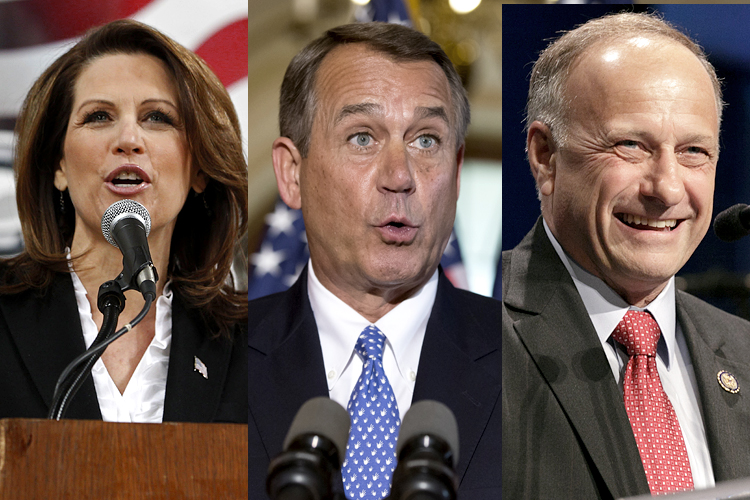As I wrote last month and also several other times over the past five or so years, “comprehensive immigration reform” — defined as a bill making it possible for currently undocumented residents to earn legal status and/or citizenship — can’t happen now because Republicans control the House of Representatives, conservatives control the Republican Party, and conservatives oppose granting legal status to undocumented immigrants. It’s a very simple calculation, and most discussions of the political status of immigration reform could start and end with some variation on that explanation.
But people need something to talk about, and politicians need reasons to go on Sunday shows. Elected officials need to “signal” to important donors and interest groups that they are doing everything in their power to enact the preferred policies of those important donors and interest groups. There is really more incentive for Republicans to talk about immigration reform than to actually pass it. Obviously lots of Republicans do sincerely want immigration reform to pass. But those Republicans don’t have a majority in the House, and until that changes, immigration reform will be practically politically impossible.
Last month, Speaker of the House John Boehner said he was confident that immigration reform could pass this year. That confidence lasted a few weeks. By the end of last week, the GOP had settled on an adequate excuse for declining to pursue their recently announced immigration “list of principles”: They can’t do anything at all because they don’t trust President Obama.
Which, fine. It’s a pretty lame excuse, but Speaker Boehner was not going to say, “I don’t have the clout or the power to unilaterally force a plurality of xenophobes and cowards ensconced in safe white districts to support a major Democratic policy priority.” Republicans were going to blame Democrats no matter what.
The flaw in their excuse, obviously, is that it leaves the GOP open to the line Sen. Chuck Schumer used on Sunday: If Obama is the problem, then Congress can pass a reform bill that won’t go into effect until 2017, when there will be a new president.
“It’s been a tough week for immigration,” he said. “But all three, many of the Republicans have said the following — Mitch McConnell, John Boehner, Paul Ryan, even Jim DeMint — they have said that they want to do immigration reform, but they don’t trust the President to enforce the law, particularly the enforcement parts. So there’s a simple solution.”
Unfortunately, coming up with a clever workaround to the arbitrarily chosen GOP excuse won’t change the fact that the arbitrarily chosen GOP excuse is only being used to distract from intractable political reality. Addressing the made-up problem won’t fix the actual one. Schumer gets points for “calling Boehner’s bluff,” but Boehner will not now be like, “well, fair point, you got me, now I guess we have to pass this bill.”
Still, it was a fun couple of weeks of once again debating whether immigration reform would pass soon! Perhaps members of Congress play this elaborate game — hyping major legislation, walking it back, calling out one another’s “bluffs” — mainly to keep the political class occupied.
It has become incredibly difficult even to pass the recurring omnibus bills — like the farm bill, which took a few years to make it through the House, and the transportation bill, which will likely cause Congress to melt down in acrimony and dysfunction once again later this fall — that Congress uses to keep the government funded and operating. The idea that new initiatives and major reforms might be possible with this Congress is just fantasy. Comprehensive tax reform? Immigration reform? “Entitlement reform”? Various politicians will claim, over the next few months, that all of those things and more could happen before the next Congress is sworn in. They will be wrong, but the political press, in need of something to talk about, will take the idea seriously for a while anyway.


